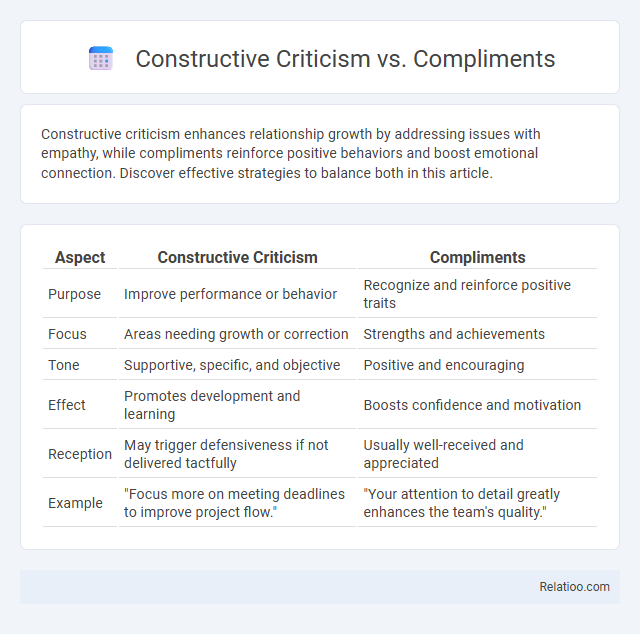Constructive criticism enhances relationship growth by addressing issues with empathy, while compliments reinforce positive behaviors and boost emotional connection. Discover effective strategies to balance both in this article.
Table of Comparison
| Aspect | Constructive Criticism | Compliments |
|---|---|---|
| Purpose | Improve performance or behavior | Recognize and reinforce positive traits |
| Focus | Areas needing growth or correction | Strengths and achievements |
| Tone | Supportive, specific, and objective | Positive and encouraging |
| Effect | Promotes development and learning | Boosts confidence and motivation |
| Reception | May trigger defensiveness if not delivered tactfully | Usually well-received and appreciated |
| Example | "Focus more on meeting deadlines to improve project flow." | "Your attention to detail greatly enhances the team's quality." |
Understanding Constructive Criticism
Understanding constructive criticism involves recognizing its role in providing specific, actionable feedback aimed at improvement, unlike compliments which simply acknowledge achievements or positive traits. Constructive criticism emphasizes clear examples and practical suggestions, fostering growth by addressing areas needing enhancement while maintaining a respectful tone. This approach contrasts with generic praise, ensuring the feedback contributes to personal or professional development.
The Psychology Behind Compliments
The psychology behind compliments reveals that genuine praise activates brain areas associated with reward, enhancing motivation and self-esteem. Constructive criticism, when balanced with compliments, helps You internalize feedback without feeling defensive, promoting personal growth. Combining compliments with constructive criticism creates a positive environment that fosters learning and emotional resilience.
Key Differences Between Criticism and Compliments
Constructive criticism provides specific, actionable feedback aimed at improving performance or behavior, while compliments focus on acknowledging and reinforcing positive qualities or achievements. You receive constructive criticism to enhance skills and address weaknesses, whereas compliments boost morale and motivation by highlighting strengths. Effective communication balances both by ensuring feedback is clear, purposeful, and supportive.
Benefits of Constructive Criticism in Personal Growth
Constructive criticism fosters personal growth by providing specific, actionable feedback that highlights areas for improvement while maintaining respect and encouragement. Unlike compliments, which boost confidence but may lack depth, constructive criticism targets skill development and self-awareness, driving continuous learning and resilience. Embracing constructive criticism helps individuals identify blind spots, refine abilities, and achieve long-term success through intentional self-improvement.
The Power of Compliments in Building Confidence
Compliments play a crucial role in building confidence by highlighting your strengths and reinforcing positive behavior, which motivates continued growth and improvement. While constructive criticism offers valuable guidance for areas of development, compliments boost morale and create a supportive environment that encourages risk-taking and learning. Balancing the power of compliments with constructive feedback helps you maintain self-esteem while fostering personal and professional growth.
When to Offer Criticism vs Compliments
Offer constructive criticism when specific improvements or growth are needed, targeting behaviors or outcomes rather than personal traits to foster development. Compliments are most effective when recognizing achievements, efforts, or positive qualities to boost morale and reinforce desirable actions. Timing is crucial; deliver constructive criticism privately and promptly to address issues, while compliments can be shared publicly or immediately to motivate and encourage.
How to Give Effective Constructive Criticism
Effective constructive criticism focuses on specific behaviors or actions rather than personal traits, providing clear, actionable feedback that helps the recipient improve. Compliments, when combined with constructive criticism, balance the conversation by recognizing strengths and motivating positive change. To ensure your feedback is well-received, deliver it with empathy, clarity, and respect, allowing Your message to foster growth without causing defensiveness.
Strategies for Offering Meaningful Compliments
Offering meaningful compliments involves focusing on specific behaviors or achievements, which helps recipients recognize their strengths clearly. Using sincere and personalized language enhances the impact, making the praise feel genuine and motivating. Combining compliments with constructive criticism creates a balanced feedback approach that fosters growth and confidence in professional and personal interactions.
Balancing Feedback: Criticism and Compliments in Communication
Balancing feedback in communication involves delivering constructive criticism and compliments effectively to foster growth without diminishing morale. Constructive criticism offers specific, actionable insights that help you improve, while compliments reinforce positive behaviors and boost confidence. Maintaining this balance ensures your feedback is both motivating and productive, enhancing relationships and overall performance.
The Impact of Feedback Styles on Relationships
Constructive criticism fosters growth by addressing specific behaviors while showing respect, enhancing trust and understanding in relationships. Compliments boost morale and reinforce positive actions, strengthening emotional bonds and motivation in your interactions. Balancing these feedback styles creates a supportive environment that promotes both personal development and strong, healthy connections.

Infographic: Constructive criticism vs Compliments
 relatioo.com
relatioo.com